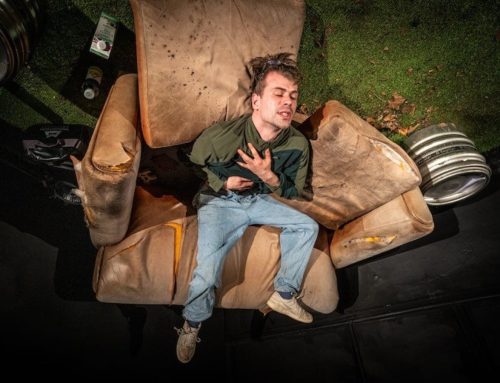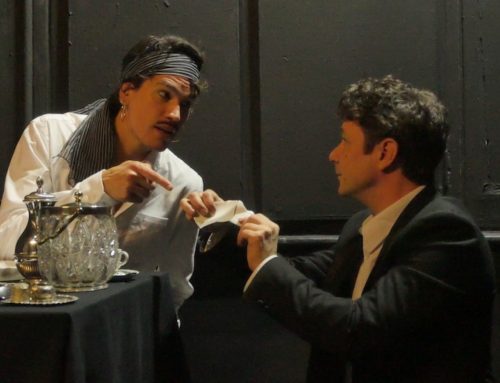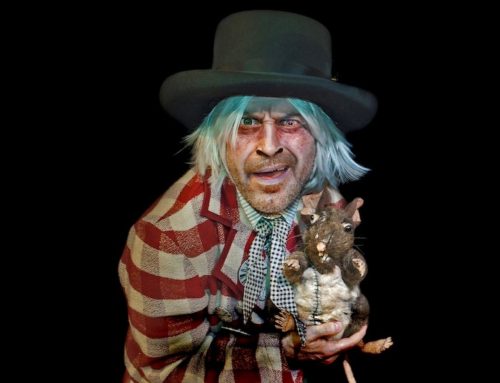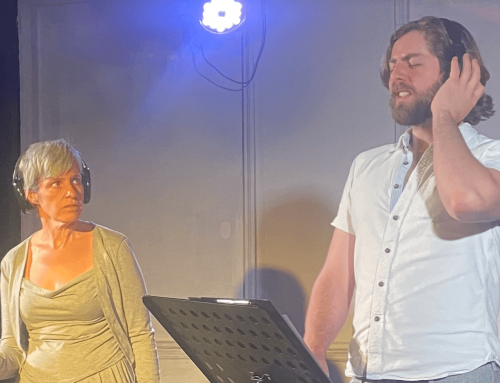The relationship between composer Gustav Mahler and his much younger wife Alma is complex and turbulent. She wants to write music and express herself creatively. He wants her to fulfil the role of a traditional Austrian Hausfrau, insisting in an emphatic pre-marriage letter that she give up composing and devote herself to his welfare. The marriage is later strained by the death of a child and Alma’s affair with a dishy Vienna architect. No wonder at one point she turns to booze and the sensuous delights of a Russian pianist.
Claire Novello’s debut full-length bioplay The Dedication charts Gustav and Alma’s relationship from its outset to Mahler’s death, pondering why on earth a gregarious talented socialite would agree to her husband’s chauvinist demands. The dramatic potential is there but the piece, a bum-numbing two hours and 50 minutes long, has too much going on, meanders all over the place, and suffers from some clunky dialogue. Ultimately the piece fails to answer the questions it poses.
Part of the problem is that the protagonists never really emerge from history as recognisable personalities. Novello’s Mahler (the hard-working Stephen Riddle certainly looks the part) is described by other characters as a man of genius, wholly deserving of writer Thomas Mann’s description as “the greatest artist of the age”. The composer’s reputation as a serial philanderer and bedder of opera sopranos suggests a big personality. Indeed, we hear he has the chutzpah to demand Vienna’s mayor stop the trams from passing outside the opera house in case they interfere with the quieter movements in his latest composition.
Yet when we come to meet Mahler, he is shy, diffident, and almost other-worldly in outlook. He hates small talk, only eats apples and wholemeal bread, and lives with a younger sister. Historical veracity perhaps, but the character surfaces oddly contradictory and ill-defined. “Is it the power of the music or the power of the man that attracts you?” a character asks Alma, clunkily. She cannot answer the question and frankly neither can we. Is this a meeting of minds or a love match? Answers come none. Quite why these two end up together remains something of an enigma.
Alma (Rebecca Bugeja does her best with what she is given) is similarly unreadable. In some scenes she is a lightweight saloon-room gossipmonger who asks in all seriousness, “do you realise the pressure I’m under as an attractive, available young woman”. In others, she is a schoolmarmish frump with a penchant for proto-feminist sermonising. Exposition heavy (and often anachronistic) dialogue does not help. “Have you met the esteemed pioneer of women’s rights Rosa Mayreder?” salon hostess Bertha (Orsolya Nagy) asks by way of making the relevant introduction. “As women know giving birth is painful and there is always the risk of death”, a character comments by way of adding jeopardy to news of Alma’s pregnancy. Yes, one suspects women know that already, as do men. For no obvious reason the characters often address each other by their full names. “Is this your lover Walter Gropius?” Gustav asks Alma before hurling his rival to the floor.
Then there are the excursions into the ephemera of the Viennese cultural milieu. We hear an awful lot in coffee drinking sessions of, variously, Freud’s psychoanalytic theory, Klimt’s controversial artworks, and Austrian high society attitudes to women. All interesting topics in their own way and one supposes they are there to add context. The writer certainly knows her stuff. But gosh do they slow the momentum. The same goes for the musical interludes. There are times one aches, indeed almost pleads for the writer to just get on with the story.
The piece comes alive periodically in the (far too few) scenes of angst between Alma and Gustav. Otherwise, the narrative unfolds in shortish he-said-she-said passages between minor characters whose only perceptible function seems to be as tools for exposition. Amanda Bailey as Alma’s mother and Dawson James as Gustav’s buddy Bruno get the best of these.
One suspects there is a credible two-hander, at least an hour shorter, hidden in the depths of The Dedication. As it stands now the piece is awfully hard work to sit through. Anita Gander’s gorgeous costumes offer something to watch amidst the extended chit chat.
Writer: Claire Novello
Director: Kenneth Michaels
More Recent Reviews
Playfight. Soho Theatre.
Writer Julia Grogan’s breathtakingly assured debut play arrives at Soho Theatre following stellar reviews at the Edinburgh Fringe and [...]
All The Happy Things. Soho Theatre.
Naomi Denny’s three-hander comedy-drama All The Happy Things covers familiar themes within a recognisable premise. A grieving protagonist comes [...]
Telly. Bread and Roses Theatre.
The challenge with absurdist comedy is that many people do not find it funny. Laughing at the sheer weirdness [...]






